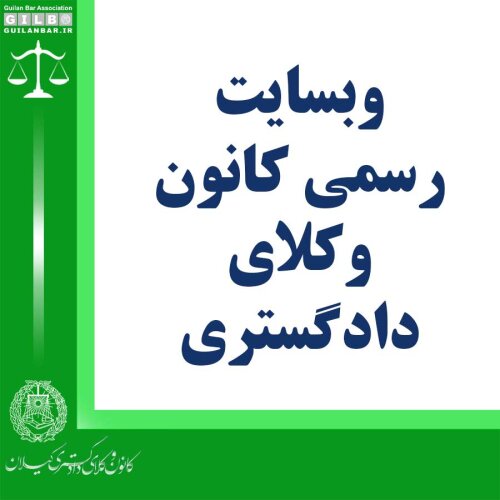Best Juvenile Law Lawyers in Rasht
Share your needs with us, get contacted by law firms.
Free. Takes 2 min.
List of the best lawyers in Rasht, Iran
About Juvenile Law in Rasht, Iran
Juvenile Law in Rasht, Iran, refers to the legal system and procedures that deal with children and adolescents who are accused of committing crimes or are in need of protection. Iranian law defines a juvenile generally as a person under the age of 18. The city of Rasht, like the rest of Iran, follows national legislation with some local application and authorities. Juvenile Law covers issues such as criminal responsibility, appropriate sentencing, rehabilitation, and the rights of minors during legal proceedings. It aims to address offenses committed by young people in a way that promotes education and reintegration, rather than just punishment.
Why You May Need a Lawyer
Navigating Juvenile Law can be complex, especially when the well-being and future of a minor are at stake. Individuals may need to seek legal advice in situations such as:
- When a minor is accused of a crime, including theft, drug-related offenses, or violence
- If a minor is a victim of abuse, neglect, or exploitation
- When there are concerns about the protection of a minor’s rights during police investigations or court proceedings
- In matters related to child custody, guardianship, or the welfare of orphaned children
- Dealing with issues of underage marriage or other family law matters involving minors
A lawyer experienced in Juvenile Law ensures that a child’s legal rights are protected and that the case is handled fairly and appropriately within the local legal framework.
Local Laws Overview
Juvenile Law in Rasht is governed by the national Islamic Penal Code and specific laws regarding children and adolescents. These key points are particularly relevant:
- Children under the age of 9 for girls and 15 for boys (Islamic lunar years) are generally not held criminally responsible and are dealt with under special legal protections.
- Juvenile courts, known in Persian as “Dadgah-e Koodakan,” handle cases involving minors. Judges are often specially trained to work with children and adolescents.
- Sentences for juveniles emphasize education and rehabilitation. Measures can include supervision, counseling, community service, and, in rare cases, detention in a reformatory.
- Minors have the right to legal representation and should be accompanied by their legal guardian during legal proceedings.
- The identities of minors involved in legal cases are protected to prevent stigma and promote successful reintegration into society.
- Special laws protect minors from child labor, neglect, abuse, and exploitation.
Frequently Asked Questions
What age is considered as juvenile under Iranian law?
In Iran, a juvenile is typically defined as anyone under the age of 18. However, criminal responsibility is assessed differently based on gender and age, with different thresholds for boys and girls according to Islamic law.
What type of crimes can juveniles be charged with?
Juveniles can be charged with a range of criminal offenses, including theft, drug offenses, assault, and property crimes. Some offenses may be referred to social services or family courts rather than treated strictly as criminal matters.
Will a juvenile be tried in the same court as adults?
No, cases involving minors are handled in special juvenile courts. Judges and staff are trained to deal compassionately and suitably with children and adolescents.
Can a juvenile receive jail time as a sentence?
In most cases, the court prioritizes educational and rehabilitative measures. Detention in a reformatory or correctional facility is possible but usually considered a last resort, and sentences are generally shorter than those for adults.
Do juveniles have the right to a lawyer?
Yes, juveniles have the right to legal representation. Lawyers play a key role in ensuring fair treatment and the protection of minors’ rights during all legal processes.
Can parents or guardians attend court hearings?
Yes, parents or legal guardians are generally required to be present during investigations and court hearings pertaining to the juvenile.
Are juvenile records sealed or confidential?
Yes, laws require that the identities and case records of juveniles be kept confidential to protect them from social stigma and encourage rehabilitation.
What happens if a juvenile is a victim of abuse or neglect?
There are specific protective laws and processes. Cases may be handled by social services, and the court can order measures to remove the child from harmful environments and ensure their safety.
What role do social workers play in juvenile cases?
Social workers often assist juvenile courts, helping to evaluate the child’s welfare and recommending rehabilitation or support services as part of the ruling.
How should I proceed if my child is accused of a crime?
You should consult a qualified lawyer specializing in juvenile law as soon as possible. They can explain your rights, represent your child, and help navigate the legal system effectively.
Additional Resources
Below are some resources and organizations in Rasht and Iran that can assist those seeking help in juvenile law matters:
- Gilan Province Juvenile Court (Dadgah-e Koodakan): Handles local cases involving minors and can provide procedural guidance.
- Iranian Bar Association, Gilan Branch: Offers lawyer referrals including those with expertise in juvenile matters.
- State Welfare Organization (Behzisti): Supports children at risk of abuse, neglect, or exploitation, including social services and counseling.
- Iranian Law Enforcement (Police): Special units for child protection can be contacted in cases of harm or criminal activity involving minors.
- Local Social Services Offices: Provide counseling, intervention, and support for children and families in crisis.
Next Steps
If you or someone you know are facing issues related to Juvenile Law in Rasht, Iran, take the following steps:
- Contact a lawyer who specializes in Juvenile Law to get an initial consultation and legal advice tailored to the minor’s situation.
- Gather all relevant documents and information regarding the case, including police reports, court notices, and identification documents.
- Ensure the minor’s rights are protected by being present during investigations and court hearings, and securing legal representation.
- Reach out to local support organizations such as social services, if the case involves abuse, neglect, or welfare concerns.
- Follow up regularly with your lawyer and any involved government authorities to stay informed about the case progress and next legal steps.
Early legal intervention can make a significant positive difference in the outcome of juvenile cases. Act quickly to secure the best support and guidance for the well-being and future of the minor involved.
Lawzana helps you find the best lawyers and law firms in Rasht through a curated and pre-screened list of qualified legal professionals. Our platform offers rankings and detailed profiles of attorneys and law firms, allowing you to compare based on practice areas, including Juvenile Law, experience, and client feedback.
Each profile includes a description of the firm's areas of practice, client reviews, team members and partners, year of establishment, spoken languages, office locations, contact information, social media presence, and any published articles or resources. Most firms on our platform speak English and are experienced in both local and international legal matters.
Get a quote from top-rated law firms in Rasht, Iran — quickly, securely, and without unnecessary hassle.
Disclaimer:
The information provided on this page is for general informational purposes only and does not constitute legal advice. While we strive to ensure the accuracy and relevance of the content, legal information may change over time, and interpretations of the law can vary. You should always consult with a qualified legal professional for advice specific to your situation.
We disclaim all liability for actions taken or not taken based on the content of this page. If you believe any information is incorrect or outdated, please contact us, and we will review and update it where appropriate.









